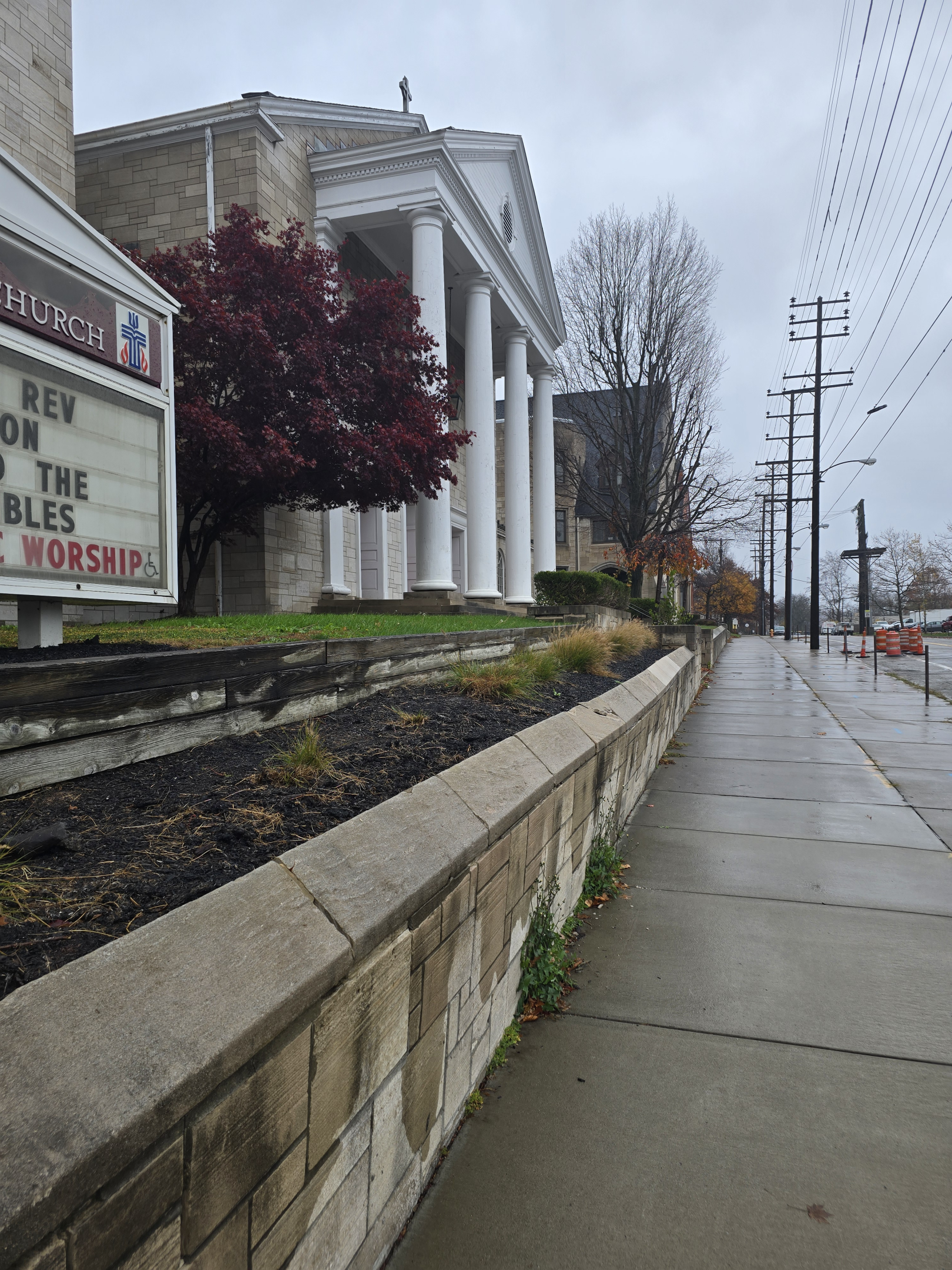Students reconstruct retaining wall for local church as part of capstone project
A group of YSU civil and construction engineering students put their skills to work this fall as they designed a plan to reconstruct a retaining wall for a local church, marking the completion of their capstone project and a significant step toward graduation.
The nine students, divided into three groups of three, took on various components of the project, from structural design to civil site work. This hands-on assignment not only serves as their final project before earning their degrees but also reflects the CCET program's commitment to community engagement and applied learning.
 Robert Korenic, professor and program coordinator, said the opportunity to work with a local church on this structural project was a perfect fit for the department’s mission. “When we were approached by the church about reconstructing the wall, it was a perfect example of the kind of real-world experience we want to offer our students,” Korenic said. “The church was in need, and we had a large group of seniors ready to graduate this fall but lacking a capstone project. It came together very quickly.”
Robert Korenic, professor and program coordinator, said the opportunity to work with a local church on this structural project was a perfect fit for the department’s mission. “When we were approached by the church about reconstructing the wall, it was a perfect example of the kind of real-world experience we want to offer our students,” Korenic said. “The church was in need, and we had a large group of seniors ready to graduate this fall but lacking a capstone project. It came together very quickly.”
The project is a key part of the CCET program’s approach, which emphasizes the importance of hands-on experience. The students are responsible for the design and also tasked with preparing an engineer's estimate and project schedule using industry standard software. They have conducted site work, including the planning of drainage and stormwater systems, and have completed calculations using software to ensure the project's structural stability.
A crucial aspect of the capstone project is the students’ upcoming presentation to their client. In the coming weeks, the students will present their plans to a panel of church representatives, including the pastor and other church officials. They will walk through their designs, answer questions and demonstrate their technical knowledge and methodology.
“Capstone projects typically involve local community partners because we want students to engage with the site, see real world issues, and apply their education in a tangible way,” Korenic explained. “This project is no different. The students are not only learning engineering principles but also the importance of working with a client and communicating effectively.”
Rev. M. Payne Warner, pastor of First Presbyterian Church, expressed his gratitude for the collaboration between the students, professors, and church.
“The Session and members of First Presbyterian Church are thrilled to have had the opportunity to work with the students in the CCET Senior Capstone Project this semester,” Warner said.
“We were connected to Professors Korenic and Sanson by one of our church members and Elders, Professor Daniel Ayana. From the beginning, everyone has been a blessing to work with. The professors found the retaining wall that runs around the corner of our property along Wick and Wood Avenues to be perfect for the student’s capstone project as it combines many of the skills and practices they need to build or hone in order to work in the field. The students are bright, and each time we have come together to discuss the project, they have listened, offered insight, and helped me understand the work they are putting in and how everything ties together for us, the church.”
The church, which has been a presence in downtown Youngstown for 225 years, sees this project as a key step in continuing to serve the community well into the future. “This project is part of our work to preserve our property and to continue contributing to our shared community,” Warner added. “Once the way forward is clear, we hope to engage with and share the progress of the project with the students, the program and the University.”
The students' work will be graded by a panel who will assess the project based on site work, structural design and constructability. The panel will provide valuable feedback, helping the students refine their skills before they enter the workforce.
The CCET program at YSU continues to provide students with learning opportunities that prepare them for successful careers in the field. By prioritizing collaboration with local community partners, the program helps to further its mission of cultivating lifelong learning and empowering students to apply their knowledge in meaningful ways.
